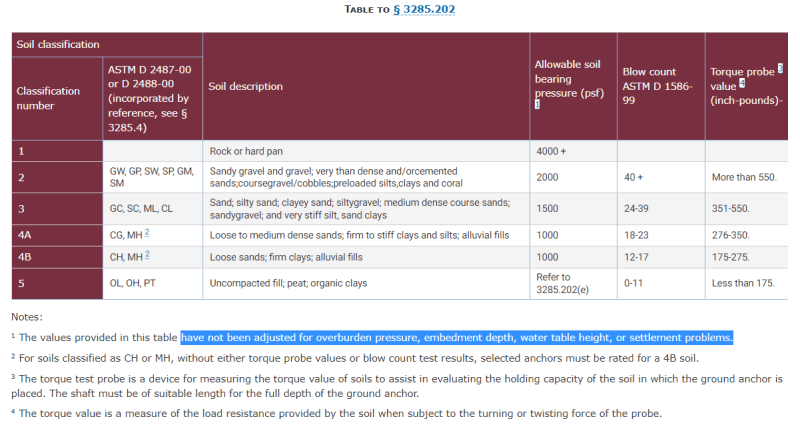thejonster
Structural
I have an owner who seems to think that helical piers just need to come to torque and voila no geotech report needed. This is an area I've spent too much time thinking about, despite previous replies seen to this same question (see bot of post), I'd like to know what y'all think with the info I've dug up.
For liability in design it seems most common to require a geotech report no matter what. This is despite the fact that the IBC allows to design without a geotech report, and the language only encourages an investigation when 'in doubt', which bugs me, and some guides I'm seeing seem to allow for this as a possibility. I'm wondering how common this is
My reasoning for always requiring the report is that the presumptive bearing values don't take settlement into account, and the owners who pinch pennies the hardest are probably also the ones who like to sue. BUT owners can do what they want and threaten to walk away, and some engineers choose to manage their risk and go for it on smaller projects.
Question:
Are there any circumstances where you design without a geotech report?
i.e.
Shallow retaining walls, low wood decks (low DL, spread out, settlement less important), accessory dwelling units, etc?
Or... Helical piers where you can (poorly) estimate bearing capacity with installation torque?
The code seems to convey that the building official should only require an investigation "where the classification, strength, or compressibility of the soil is in doubt"
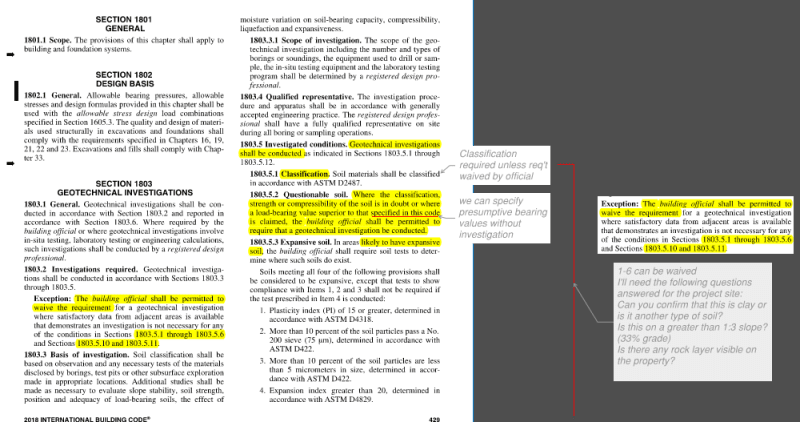
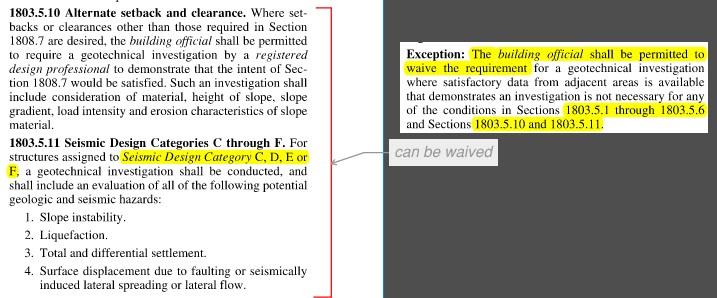
Some helical manuf recommend an alternative soil investigation, see pg 24 (2-5)
HELI-PILE® SIMPLIFIED DESIGN AND INSPECTION GUIDE

Deep Foundations Institute (DFI), Helical Pile Foundation Design Guide
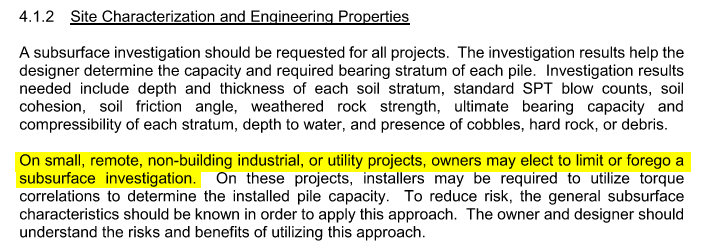
Helical Piles A Practical Guide to Design and Installation Howard A. Perko
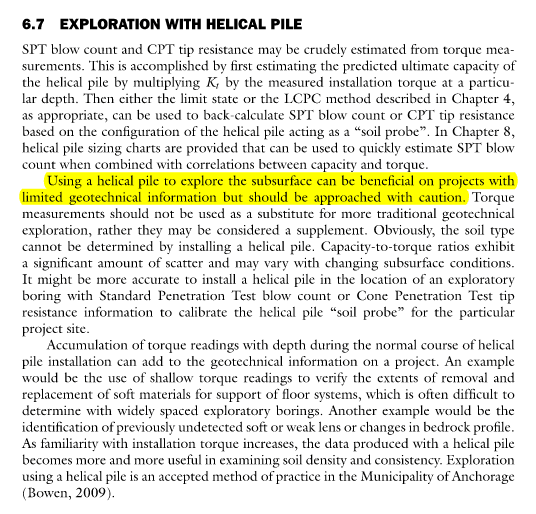
Load test can exceed a geotech report, could it replace?
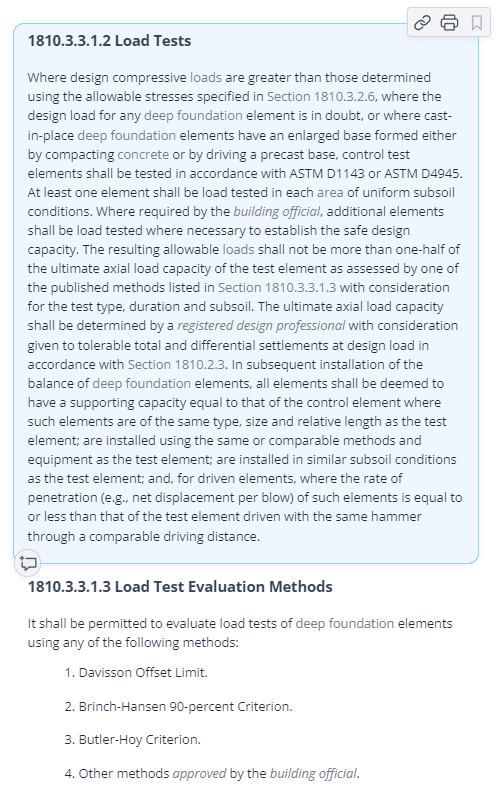
...
Included as background:
My summary of responses to this same question
[how to assume drilled pier skin friction and lateral capacity for patio column. no geotech. - Eng-Tips](You can't. You need to know the type and characteristics of the subsoil.
[Drilled piers and load testing - Eng-Tips](you are barking up a dangerous tree without any geotechnical input before you start your design.
I would be very very careful in showing a deep foundation system without a geotechnical report. I would also be very careful of an Owner/Client that is too cheap to pay for a soils report for a structure requiring deep foundations; this may not be a good client on a number of levels.
[Frost Adfreeze for Screw Pile Design - Foundation engineering - Eng-Tips](i would still be very concerned without a geotech report.
Suggest to at least get some soil boring data of the site based on your concerns. It will help you also to choose the size of the helical piles. Also, I guess that the contractor has historical torque-resistance data for similar soil conditions you are dealing with, otherwise the torque - relationship you are planning to use may be useless.
For liability in design it seems most common to require a geotech report no matter what. This is despite the fact that the IBC allows to design without a geotech report, and the language only encourages an investigation when 'in doubt', which bugs me, and some guides I'm seeing seem to allow for this as a possibility. I'm wondering how common this is
My reasoning for always requiring the report is that the presumptive bearing values don't take settlement into account, and the owners who pinch pennies the hardest are probably also the ones who like to sue. BUT owners can do what they want and threaten to walk away, and some engineers choose to manage their risk and go for it on smaller projects.
Question:
Are there any circumstances where you design without a geotech report?
i.e.
Shallow retaining walls, low wood decks (low DL, spread out, settlement less important), accessory dwelling units, etc?
Or... Helical piers where you can (poorly) estimate bearing capacity with installation torque?
The code seems to convey that the building official should only require an investigation "where the classification, strength, or compressibility of the soil is in doubt"


Some helical manuf recommend an alternative soil investigation, see pg 24 (2-5)
HELI-PILE® SIMPLIFIED DESIGN AND INSPECTION GUIDE

Deep Foundations Institute (DFI), Helical Pile Foundation Design Guide

Helical Piles A Practical Guide to Design and Installation Howard A. Perko

Load test can exceed a geotech report, could it replace?

...
Included as background:
My summary of responses to this same question
[how to assume drilled pier skin friction and lateral capacity for patio column. no geotech. - Eng-Tips](You can't. You need to know the type and characteristics of the subsoil.
[Drilled piers and load testing - Eng-Tips](you are barking up a dangerous tree without any geotechnical input before you start your design.
I would be very very careful in showing a deep foundation system without a geotechnical report. I would also be very careful of an Owner/Client that is too cheap to pay for a soils report for a structure requiring deep foundations; this may not be a good client on a number of levels.
[Frost Adfreeze for Screw Pile Design - Foundation engineering - Eng-Tips](i would still be very concerned without a geotech report.
Suggest to at least get some soil boring data of the site based on your concerns. It will help you also to choose the size of the helical piles. Also, I guess that the contractor has historical torque-resistance data for similar soil conditions you are dealing with, otherwise the torque - relationship you are planning to use may be useless.

![[pipe] [pipe] [pipe]](/data/assets/smilies/pipe.gif)

